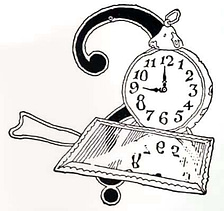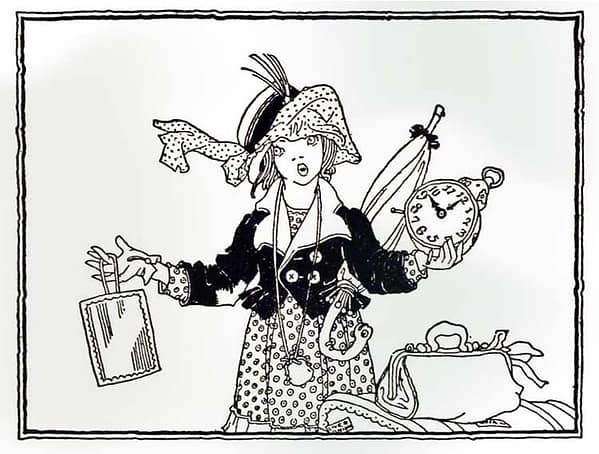One morning when big white clouds were shouldering each other’s shoulders, rolling on the rollers of a big blue sky, Blixie Bimber came along where the Potato Face Blind Man sat shining the brass bickerjiggers on his accordion.
“Do you like to shine up the brass bickerjiggers?” asked Blixie.
“Yes,” he answered. “One time a long time ago the brass bickerjiggers were gold, but they stole the gold away when I wasn’t looking.”
He blinked the eyelids over his eyeballs and said, “I thank them because they took the gold they wanted. Brass feels good to my fingers the same as gold.” And he went on shining up the brass bick- erjiggers on the accordion, humming a little line of an old song, “Tomorrow will never catch up with yesterday because yesterday started sooner.”
“Seems like a nice morning with the sun spilling bushels of sunshine,” he said to Blixie, who answered, “Big white clouds are shouldering each other’s shoulders rolling on the rollers of a big blue sky.”
“Seems like it’s April all over again,” he murmured, almost like he wasn’t talking at all.
“Seems just that way—April all over again,” murmured Blixie, almost like she wasn’t talking at all.
So they began drifting, the old man drifting his way, the girl drifting her way, till he drifted into a story. And the story he told was like this and in these words:
“Deep Red Roses was a lovely girl with blue skylights like the blue skylights of early April in her eyes. And her lips reminded people of deep red roses waiting in the cool of the summer evening.
“She met Shoulder Straps one day when she was young yet. He promised her. And she promised him. But he went away. One of the long wars between two short wars took him. In a faraway country, then, he married another girl. And he didn’t come back to Deep Red Roses.
“Next came High High Over, one day when she was young yet. A dancer he was, going from one city to another city to dance, spending his afternoons and evenings and late nights dancing, and sleeping in the morning till noon. And when he promised she promised. But he went away to another city and after that another city. And he married one woman and then another woman. Every year there came a new story about one of the new wives of High High Over, the dancer. And while she was young yet, Deep Red Roses forgot all about her promise and the promise of High High Over, the dancer who ran away from her.
“Six Bits was the next to come along. And he was not a soldier nor a dancer nor anything special. He was a careless man, changing from one job to another, changing from paper-hanging to plastering, from fixing shingle roofs where the shingles were ripped to opening cans with can openers.
“Six Bits gave Deep Red Roses his promise and she gave him her promise. But he was always late keeping his promise. When the wedding was to be Tuesday he didn’t come till Wednesday. If it was Friday he came Saturday. And there wasn’t any wedding.
“So Deep Red Roses said to herself, ‘I am going away and learn, I am going away and talk with the wives of High High Over, the dancer, and maybe if I go far enough I will find the wife of Shoulder Straps, the soldier—and maybe the wives of the men who promised me will tell me how to keep promises kept.’
“She packed her baggage till her baggage was packed so full there was room for only one more thing. So she had to decide whether to put a clock or whether to put a looking glass in her baggage.
“ ‘My head tells me to carry the clock so I can always tell if I am early or late,’ she said to herself. ‘But my heart tells me to carry a looking glass so I can look at my face and tell if I am getting older or younger.’
“At last she decides to take the clock and leave the looking glass—because her head says so. She starts away. She goes through the door, she is out of the house, she goes to the street, she starts up the street.
“Then her heart tells her to go back and change the clock for the looking glass. She goes back up the street, through the door, into the house, into her room. Now she stands in front of the clock and the looking glass saying, ‘Tonight I sleep home here one more night, and tomorrow morning I decide again.’
“And now every morning Deep Red Roses decides with her head to take the clock. She takes the clock and starts away and then comes back because her heart decides she must have the looking glass.
“If you go to her house this morning you will see her standing in the doorway with blue skylights like the blue sky of early April in her eyes, and lips that remind you of deep red roses in the cool of the evening in summer. You will see her leave the doorway and go out of the gate with the clock in her hands. Then if you wait you will see her come back through the gate, into the door, back to her room where she puts down the clock and takes up the looking glass.
“After that she decides to wait until tomorrow morning to decide again what to decide. Her head tells her one thing, her heart tells her another. Between the two she stays home. Sometimes she looks at her face in the looking glass and says to herself, ‘I am young yet and while I am young I am going to do my own deciding.’
 Blixie Bimber fingered the end of her chin with her little finger and said, “It is a strange story. It has a stab in it. It would hurt me if I couldn’t look up at the big white clouds shouldering their shoulders, rolling on the rollers of the big blue sky.”
Blixie Bimber fingered the end of her chin with her little finger and said, “It is a strange story. It has a stab in it. It would hurt me if I couldn’t look up at the big white clouds shouldering their shoulders, rolling on the rollers of the big blue sky.”
“It is a good story to tell when April is here all over again—and I am shining up the brass bickerjiggers on my accordion,” said the Potato Face Blind Man.
